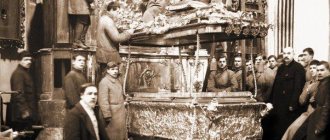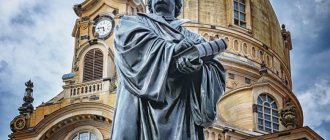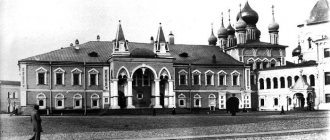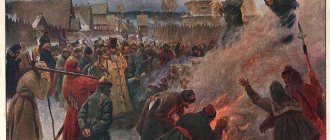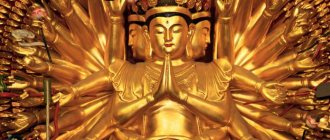On February 29, 1924, the last traditional ceremony of the festive visit of the last caliph of Turkey to the mosque in Istanbul took place. The next day, a meeting of the Grand National Assembly of Turkey took place, at which Mustafa Kemal made a speech in which he accused the former authorities of the countries of using Islam as a political tool.
He demanded that the Islamic religion be returned to its “true purpose.” This speech marked the beginning of the creation of a secular state in Turkey and the separation of religion from it. However, Islam is still considered the dominant religion here.
Türkiye is a secular state. Islam dominates here
Türkiye is officially called the Republic of Turkey. This state is unique in that it is located in both Asia and Europe. In addition, on its territory there are shrines of several world religions. Modern Turkey was formed in 1923 after the collapse of the Ottoman Empire as a result of its defeat in the First World War.
This defeat gave rise to the national liberation war of the Turkish people, which led to the overthrow of the monarchy and the creation of a Turkish national state in the territory of eastern Thrace, Asia Minor and the Armenian Highlands.
Modern Turks. In Turkey, religion is constitutionally separated from the state, with Islam dominating the country. Photo: upload.wikimedia.org
Religion in Turkey is legally separated from the state, and freedom of religion is guaranteed to every resident of the country. Article 3 of the country's Constitution states: “The Republic of Turkey is a democratic, secular and social state based on the rule of law; based on the concept of public peace, national solidarity and justice; respectful of human rights, faithful to Atatürk’s nationalism and based on the main principles set out in the preamble.”
In addition, Art. 24 establishes the right to freedom of conscience, religion and religious beliefs. In addition, it establishes the right to free expression of religious beliefs.
96% of the population
Turkey practices Sunni Islam
Education and training in religion and ethics in Turkey is carried out under the control and supervision of the state. Education in religious culture and ethics is a mandatory element in the curriculum of primary and secondary schools.
It should be noted that after the 1980 coup d’etat, the strategy of “Turkish Islamic synthesis” was adopted, when the government began to rely more on religious institutions.”
Video: Sufi brotherhoods - tariqas (narrated by Islamic scholar Roman Silantiev). At 45 seconds, the author begins to talk about the history of Sufi tariqah orders.
It is quite easy to answer the question: what is the main faith of the Turks. The fact is that 96% of the country's residents profess Sunni Islam: Hanafi madhhab and Maturidism. In addition, Islamic brotherhoods - tariqas - are very common in Turkey.
The most famous of them are the Naqshbandi and Mevlevi tariqats. The Shafi school of thought is practiced mainly by Kurds. In addition, 321 communities of various Christian denominations and trends, 36 Jewish synagogues, 60 communities of Assyrian-Nestorians, Orthodox Bulgarians, Arabs and Armenian Catholics, and 52 communities of various Protestant trends are registered in the country. In addition, some Kurds in the east of the country profess a syncretic religion and are called Yazidis.
Is a military bloc possible?
And yet, will Türkiye be able to create a military bloc of Turkic states? Alexander Mikhailovsky answers this question in an article for MK, which was replicated by the Turkish media, but this part was unanimously ignored:
“Everything is rosy in dreams. But in reality, there are too many contradictions between Turkic countries and peoples. Take, for example, the tense relations between Uzbekistan and Kyrgyzstan. And in each of the Turkic countries there are political parties, movements - everything is far from being so homogeneous. Moreover, the governments themselves are ready to receive military assistance from Turkey, but they don’t really want to become the Janissaries of our time. It is not profitable for them to quarrel with China, and even with Russia. This partnership comes with financial benefits and more. What does Türkiye give? A bare idea and a proposal to fight for unknown reasons and with whom. But definitely fight. Who needs this? I think that they can succeed in an ASEAN-level bloc. Economic block. But definitely not the Turkish version of NATO.”
Despite the secular nature of the Turkish state, Islam predominates in the country
What religion dominates among the Turks is indicated in population census data. They say that the first religion in Turkey in terms of number of adherents and importance is Islam. The establishment of Islam in the territory of modern Turkey was completed by the second half of the 11th century, when the Seljuk Turks expanded into Eastern Anatolia.
Today, 99.8% of Turkey's population is Muslim. Moreover, about 80% of Muslims are Sunnis, and Shia Alevis make up about 20% of the Muslim population. About 3% of the Muslim population are Twelver Shiites.
"Portrait of Sheikh-ul-Islam." Hood. Ali-bek Huseyn-zade. The spiritual leader of the Ottoman Empire, Sheikh-ul-Islam, controlled the power of the Sultan by issuing fatwas. Photo: upload.wikimedia.org
In the Ottoman Empire, the spiritual power of the country was controlled by Sheikh-ul-Islam, the highest Muslim cleric of the empire. At the same time, the Islamic clergy had great influence, since by the 19th century the inalienable possessions in their hands (waqf lands) accounted for almost a third of all cultivated land in the empire.
At the same time, Sheikh-ul-Islam had the exclusive right to interpret the decision of the imperial authorities from the point of view of the Koran and Sharia. He controlled the power of the Sultan, since he could issue fatwas approving or disapproving of the ruler's decrees.
In the Ottoman Empire, Sheikh-ul-Islam controlled the power of the Sultan.
In the Ottoman Empire, all other religions were put in a subordinate position. The patriarchs of the Greek Orthodox and Armenian Gregorian communities, as well as the chief rabbi of the Jewish community, were installed as mediators between the Sultan and the non-Muslim population.
The sultans granted favors to the heads of communities as payment for keeping their flock in obedience. In the 19th century, religion began to slow down the country's progress.
At the same time, Türkiye suffered a number of defeats in wars. So in 1856, after the end of the Crimean War, the “Decree on Reform” was adopted. He equated the religious rights of non-Muslims with the rights of Muslims.
Some taxes and laws restricting their rights were abolished. The Constitution of the Ottoman-Turkic State of 1860 gave non-Muslims the right to participate in government.
Sunnis and Shiites
Sunnis make up 4/5 of all Muslim residents of Turkey. The split of Islam into two branches occurred for political reasons. Opinions were divided when the question arose about choosing a future ruler. Everyone agreed that he should be a man from the family of Muhammad. But the views did not agree on which clan the ruler should belong to.
Sunnis and Shiites do not shun each other in the acts of worship that Turkey's main religion encourages. They can pray together and go on pilgrimage. Both of them honor the Koran and observe the five “pillars” of faith. Conflicts between these religious movements occur extremely rarely, since the Shiites, aware of their small numbers, try in every possible way to avoid them.
Mustafa Kemal's reforms made Turkey a secular country
Türkiye owes its secular character to Mustafa Kemal Ataturk. Before the reforms he carried out in the Ottoman Empire, patrimonial sultanism relied on the personal guard of the Sultan (Janissaries) and the secular bureaucracy (kapikulu).
They were “slaves of the Sultan” and were recruited from among dependent people. Mustafa Kemal became the leader of the “modernizing elite of Turkey, whose ideals in the 19th century were: secularism, Turkism, republicanism, Europeanization (alafranga). On his initiative, the Koran was translated into Turkish.
Turkish President Mustafa Kemal Ataturk. Mustafa Kemal carried out reforms in Turkey that made it a secular country dominated by Islam. Photo: upload.wikimedia.org
Mustafa Kemal, nicknamed Ataturk or “father of the Turks,” proclaimed the principle of Tsatsizm (secular principle), which affected the education and sphere of government of the country. Since Islam has always been and remains an important part of the lives of Turkish citizens, it has met with the greatest resistance.
That is why there have been repeated attempts at rebellion in the country. In the 1980s, the emergence of Turgut Ozal on the political scene was marked by the doctrine of Turkish-Islamic synthesis.
In his opinion, Islam needed to be made an ally of liberalization and modernization. The government of Taip Recep Erdogan operates in the same vein, trying to return some elements of Islamism to the life of the country.
Christianity has a long history in Turkey
Nowadays, Christians in Turkey are a religious minority, as their number constitutes only 0.6% of the country's population. At the same time, it has a long history. Thus, such revered saints among Christians as the Apostle Paul, Timothy of Ephesus (to whom Paul addressed two Epistles to Timothy), Polycarp of Smyrna and Nicholas the Wonderworker (also known as Santa Claus) were born here.
Apostle Paul. Icon. Andrey Rublev. The Apostle Paul was born in what is now Turkey. Photo: upload.wikimedia.org
Christianity appeared in Turkey in apostolic times. It was here, in the city of Antioch (now Antakya), that Christians first began to be called Christians (Acts 11:26). The Apostle Paul was a native of the Cilician city of Tarsus (now the province of Mersin). He preached in Pamphylia (Acts 13:13), Iconium (Acts 14:1), Lycaonia (Acts 14:6), Cilicia (Acts 15:41) , Galatia (Epistle to the Galatians) and the inhabitants of the city of Colossae (Epistle to the Colossians).
As a result of his preaching, powerful Christian communities were formed in Ephesus (Paul addressed a personal message to the residents of this city), Smyrna, Pergamum, Thyatira, Sardis, Philadelphia and Laodicea (Seven Churches of the Apocalypse in Asia).
Christians first began to be called this way in Turkey.
At the beginning of the 4th century, the center of the Roman Empire was moved to Turkey, and the Byzantine Empire was established here with its capital in Constantinople (now Istanbul). The largest Christian temple, Hagia Sophia, Hagia Sophia, was built in Constantinople, which became a mosque after the conquest of the city by the Turks.
Christianity becomes the official religion of the new state formation. The residences of the Orthodox patriarchs of Constantinople and Antioch are established here.
Saint Sophia Cathedral. Hagia Sophia, Hagia Sophia, Turkey's greatest Christian shrine. The former patriarchal Orthodox cathedral, later a mosque, now a museum. Photo: upload.wikimedia.org
On the territory of Turkey in the 4th-8th centuries, in the cities of Constantinople, Nicaea (now Iznik), Chalcedon (now Kadikoy) and Ephesus, Ecumenical Councils were held, which laid the foundations of Christian dogmatics. In addition, the most important intellectual center of Christianity at that time was Cappadocia. Such great saints and theologians lived here as: Basil the Great, Gregory of Nyssa and Gregory of Nazianzus.
Ethnic composition
For many centuries, constant contacts and mixing of many peoples took place in Turkey. The ancient inhabitants of Anatolia were similar in appearance to the Sumerians of Mesopotamia and the Turanian Turks of Central Asia. Starting approximately from the 20th century. BC, when a few Indo-European tribes invaded Anatolia, creating the Hittite kingdom on its territory, and during the entire subsequent period, when the region was under the rule of the Greeks, Romans, Byzantines and Ottomans, the indigenous population underwent minor changes. The Turkic tribes that settled here later became another ethnic component.
All branches of Christianity are present in Turkey, but most of all there are Orthodox Christians
Nowadays in Turkey there are representatives of all branches of Christianity: Orthodoxy, Catholicism, Protestantism. At the same time, you can understand what religion the Turks profess besides Islam by studying the country’s census data. According to 2011 data, a third of all Turkish Christians are Orthodox: they live mainly in Istanbul.
At the same time, the Greeks recognize the spiritual authority of the Patriarch of Constantinople. There are representations of the Russian and Bulgarian Orthodox churches. Believing Armenians belong to the Apostolic and, to a lesser extent, Catholic churches. Protestants make up 7% of the total number of Christians; in particular, in Izmir there is a Baptist community that is part of the Turkish Association of Protestant Churches.
III-XV
in these centuries Orthodoxy was the main religion of Turkey
As for Orthodoxy, after 1054 it was the main religion of modern Turkey in the 3rd-15th centuries. Up until the 20th century it was considered a significant religious minority. Orthodoxy in the country was practiced by Greeks and Arabs. Since the 1920s, Orthodoxy in Turkey has sharply lost the number of its parishioners.
In modern times, Orthodox communities remain in Istanbul and on the islands. The entire territory of Turkey is within the ecclesiastical jurisdiction of the Patriarchate of Constantinople (Hatay was formerly part of the Patriarchate of Antioch).
The Russian Orthodox Church has a small presence in the country. As of 2011, according to some researchers, the number of Orthodox Christians in Turkey is 0.008% of the country's population (i.e., about 5897 people).
Archbishop of Constantinople - New Rome and Ecumenical Patriarch Bartholomew I. The Orthodox in Turkey are mainly under the jurisdiction of the Patriarchate of Constantinople. Photo: upload.wikimedia.org
The number of Catholics in Turkey is about 35 thousand people (0.05% of the total population. Catholicism in Turkey is represented by believers of the Greek Catholic, Roman Catholic, Armenian Catholic, Syrian Catholic and Chaldean Catholic churches.
Catholics in Turkey live mainly in Istanbul and its surrounding areas. Most Latin Rite Catholics belong to the Levantine ethnic group. The number of Catholics in the country began to decline sharply after the Turkish authorities carried out the Armenian genocide in 1915.
Nowadays, Christian churches do not have legal entity status in Turkey, which prevents them from engaging in full-fledged activities.
Monastery of the Holy Apostles, Mouch, photograph from the early 20th century. The number of Christians in Turkey has sharply decreased after the Armenian genocide carried out by the country's authorities. Photo: upload.wikimedia.org
There is no exact information on the number of Protestants in Turkey. International human rights organizations estimate their number at 6,000. Ethnically, the adherents of this movement are Armenians, Greeks, Assyrians, Bulgarians, and in some cases also Turks. Human rights activists accuse the Turkish authorities of persecuting Protestants, many of whom are Armenians. These accusations are denied by the Turks.
Main religious holidays: Ramadan
The religion of Turkey, which is followed by the majority of the country's inhabitants, includes the observance of three main holidays. Ramadan, which covers part of January and February, is considered the month of the appearance of the holy book of the Koran. At this time, according to the majority of residents of Turkey, the entrance to Hell closes and opens to Paradise, people get rid of the influence of evil.
Ramadan is a time for repentance and good deeds. Muslims believe that past sins are forgiven more easily this month, and violations of the Koran committed during this holy period are punished more severely. Ramadan is celebrated by fasting - eating, drinking, smoking and having intimacy is prohibited only during daylight hours.
In addition to Islam and Christianity, other religious communities are represented in Turkey
In Turkey, in addition to Islam and Christianity, there are representatives of other religions. So in our time there are 24,000 Jews living in the country. Türkiye was the first Muslim state to recognize the legitimacy of the State of Israel. Most Turkish Jews are descendants of Serfards and live in Istanbul. Their synagogues are also located here.
Yezidis of the Mardin region (now Southern Türkiye). There are Yazidi Kurdish communities in Turkey. Their number is insignificant. Photo: upload.wikimedia.org
Alevis (numbering almost 14 million people, about 20% of the population) are not a recognized religious minority and are often victims of discriminatory policies of the Turkish authorities. Some Kurds in the east of the country profess a syncretic religion and are called Yezidi Kurds.
Their number is insignificant. In addition, it is worth mentioning the Order of Freemasons. Freemasonry is not considered a religion, but despite this it has great influence among the Turkish elite. To this day, the Grand Lodge of Turkey is one of the most influential organizations in the country; Among its members are the highest generals, government officials, and representatives of the intelligentsia.
By leaving a comment, you accept the user agreement


